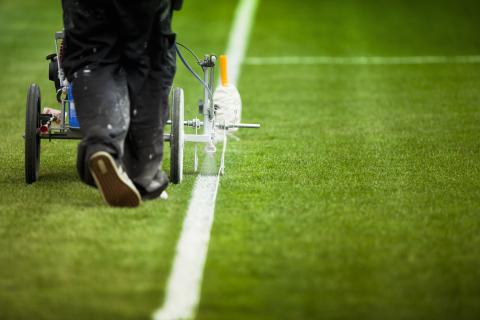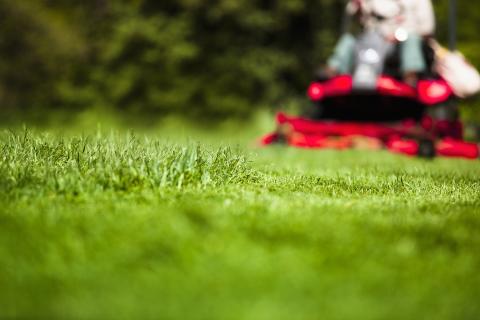As we celebrate the hard work, incredible dedication and talent of grounds management teams across the nation during #GroundsWeek 2022 (28 Feb – 6 march), we thought we’d put together a helpful guide for those interested in entering the profession.
Looking to re-train in a new outdoor career? Or thinking about your career path following school? Find out more about the roles, relevant training and experience you’ll need in this article.
Overview of a groundskeeper’s typical roles and responsibilities
A grounds person or keeper is primarily responsible for the care and maintenance of turf across a variety of facilities including sports grounds (football, rugby, cricket etc), outdoor recreational and amenity grounds like parks and green spaces, along with private estates. Daily tasks typically comprise of maintaining the high quality of various types of playing surfaces, turf management and pitch marking, the operation of hand-held and ride-on machinery and pesticide and fertiliser application.
Ground keepers will carry out these duties using a wide range of equipment and machinery, which they’ll need to use safely and competently. These tools will also need to be regularly inspected, sharpened and maintained, which will help with efficiency and precision. Along with machinery use, pesticide spraying and application will also need to be used safely and competently.
Other duties can include carrying out a variety of grounds care practices on hybrid, natural and artificial surfaces, assisting with general maintenance of landscape areas, operating irrigation systems, paths, borders and hedges maintenance, leaf clearance and removal and tree/shrub planting.

Training and apprenticeships
There are plenty of routes into the grounds keeping profession depending on your level of practical experience and knowledge.
A great starting route into the industry would be a level 2 Sports Turf Operative apprenticeship, which is designed to equip individuals with the skills, knowledge and behaviours needed to meet the professional standard for the industry.
This apprenticeship length is typically 18-24 months and comprises of on-the job training with an employer, combined with learning delivered at a local educational facility such as a land-based college like Myerscough College. Once the individual is ready, they will be assessed during an ‘end point assessment’ to demonstrate they have the correct practical and theoretical knowledge.
Minimum entry requirements for this apprenticeship are a 3 in Maths and English GCSE under the new grading system. Alternatively, a D as minimum in the old grading system, or a level 1 in function skills etc.
Other dedicated courses, qualifications or degrees at a specialist land-based college, which can be studied either full or part time, can include:
- Certificate or diploma in sports and amenity turf maintenance
- Certificate in practical horticulture skills
- Advanced technical certificate in horticulture, landscape or sportsturf
- Sports turf operative standard
- Intermediate apprenticeship in workbased horticulture – sportsturf – greenkeeper
- BSc (Hons) Sportsturf science and management
- FdSc Sportsturf management
- MSc Sustainable sportsturf management
Another route can include volunteering at your local football or rugby club to gain on-the-job experience and training, which can in turn help you land a full or part time job. Volunteering in your spare time will help you demonstrate personal development, professional skills development, and an advancement in CPD.

College Providers
Considering a course or qualification at a college? Here’s a handy list of UK and Irish colleges currently running industry-specific training courses and apprenticeships:
- Askham Bryan College
- Barnsley College
- Berkshire College of Agriculture (BCA)
- Bishop Burton College
- Bridgend College
- Bridgwater & Taunton College
- Burnley College
- College of Agiculture, Food & Rural Enterprise (CAFRE)
- East Durham College
- Myerscough College
- Reaseheath College
- Shipley College
- South Staffordshire College
- SRUC
- Writtle University College
- Warwickshire College Group – Pershore College
Relevant qualifications and training courses
Once you’ve passed your college course or apprenticeship and are in part/full-time work, it’s vital to keep your practical qualifications and knowledge up to date with industry standards and legislation.
You can do this by completing a range of relevant training courses and refreshers at approved training Providers across the UK. Once completed, you’ll receive a certificate in that skill, allowing you to use your knowledge and practical experience in that field in your day-to-day jobs.
Relevant qualifications and courses include:
- Awareness of integrated weed management
- Brushcutters/trimmers
- Clearing saws
- Combi tractor mower
- Emergency first aid at work
- Hand-held hedge trimmer
- Initial sports line marking
- Installation of artificial grass surfaces
- Lantra groundcare maintenance suite:
- Leaf blowers
- Level 2 award in the safe use of pesticides
- Pedestrian mowers
- Principles of lawn care
- Remote control mowers
- Ride-on mowers
- Safe use of pesticides
- Synthetic sports surface maintenance
- Trimmers grass cutting
Career Overview
Progressing from an apprenticeship, you could go straight into a Junior or Assistant Grounds Person role, working your way up to Head of the Groundsperson, Grounds Manager or Grounds Maintenance Manager.
If you want to pursue your career further, there are roles such as Head of Grounds at an estate, Grounds Manager at a high profile sporting venue or conducting industry research and development at a specialist institute or college/university.
Employers
If you’re interested in pursuing a career working at a sports ground, there are a number of varied venues across the UK and Ireland covering cricket, football, tennis, hockey, rugby and bowls. They range from local leagues and local authority run facilities, ranging up to private grounds such as premier league sports clubs and national venues.
If you’re looking for a more amenity open space and estate based management route, the best place to contact will be your local authority, private gardens or schools, or trust run properties which are visited by the public.
Specialist groundskeeping websites such as the Grounds Management Association or Pitch Care are a great place to look for up-to-date job listings and opportunities.
Benefits
There are many benefits to working in groundskeeping, primarily working in an outdoor environment and with nature. You can often help improve natural habitats and encourage more wildlife on the course if that’s an area you’re keen to explore.



